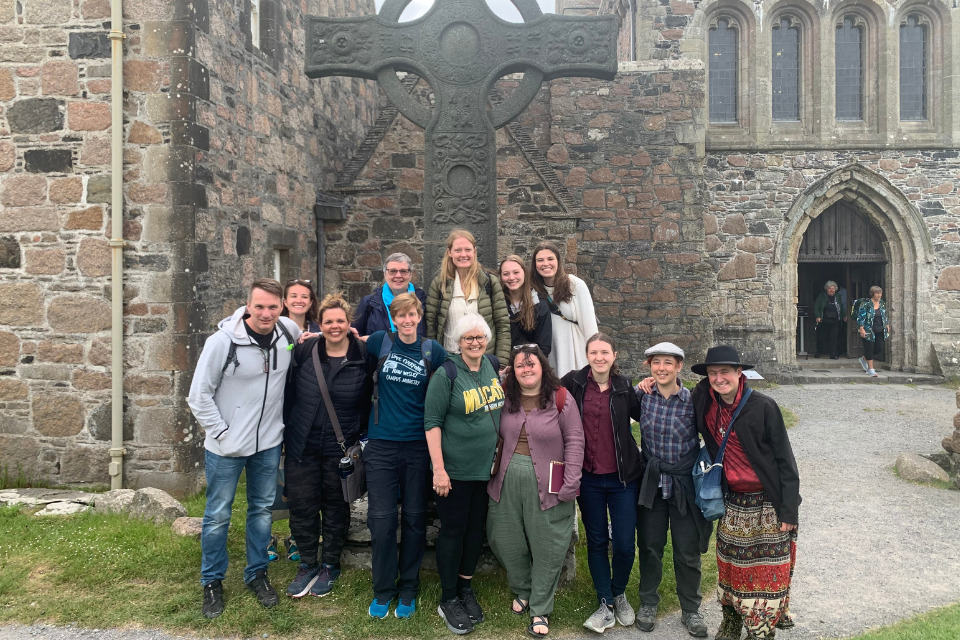A group of young adults from Northern Michigan University traveled to Iona, Scotland, and returned with a new perspective on the world and our place in it.
JAMES DEATON
Content Editor
“The version of me that was on Iona saw things in a different light. And that’s something that I will remember and be able to reflect on forever,” ruminated Sylvia Dhaseleer.
This spring, Sylvia and six other students from Northern Michigan University (NMU) Wesley, three campus ministry leaders, and three adults from the Marquette community spent eleven days in Scotland on a spiritual pilgrimage.
Most of that time was spent living with others from around the world in an intentional Christian community on Iona, a tiny island off the western coast.
Those days spent on this holy island thousands of miles from Michigan and all that was familiar surprised Sylvia and all those who journeyed with her. They were changed by their experiences.
The Iona Community is a welcoming place where all are drawn in by the beauty of God’s creation and nourished by a community that is deeply committed to following Christ in working for peace and justice for all people and God’s creation.
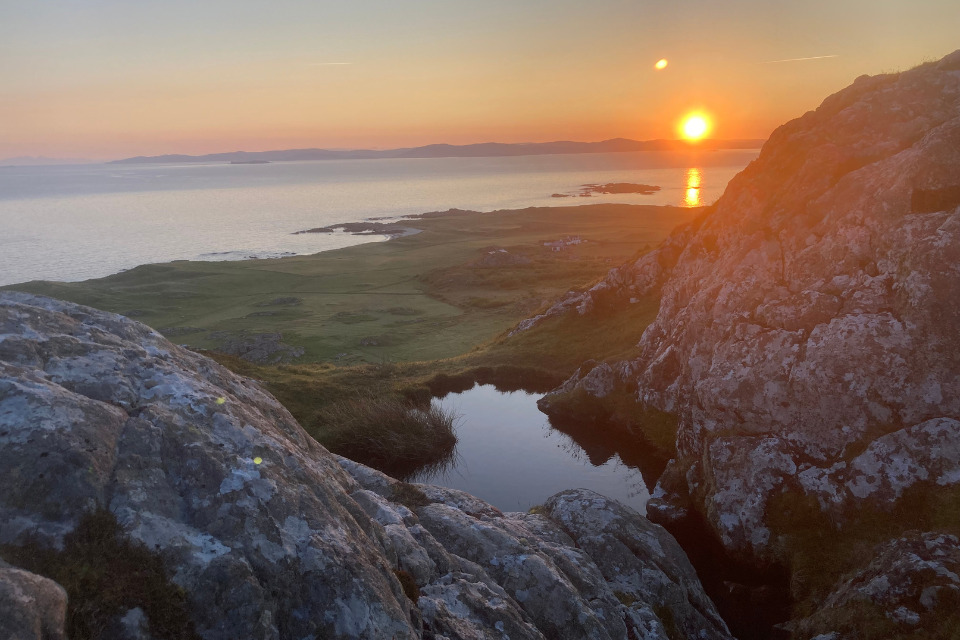
The island of Iona is off the beaten path, but it’s not unknown. In fact, many ferry-loads of day-trippers and overnight guests make their way from the mainland to this emerald-green isle that has been a sacred site for centuries. Many say it’s the birthplace of Christianity in Scotland.
St. Columba sailed from present-day Ireland to establish a monastery there in the sixth century, advancing the gospel among the people. A Celtic brand of Christianity evolved over centuries, thanks to being isolated from the mother church in Rome. This spirituality had a better grasp of the interconnectedness of all and was shaped by a deep relationship with God’s creation.
In the twelfth century, a more permanent stone Benedictine abbey was erected, and pilgrims continued to come to Iona to pay homage to St. Columba, even after the Protestant Reformation ended monastic life on Iona in the sixteenth century.
After many years of neglect, this stone abbey eventually became of interest to a group that sought to rebuild it and establish a new community. The Iona Abbey was restored by trainee ministers, students, and unemployed workers from Glasgow, and this coming together of work and spirit by a diverse group of people inspired Rev. George MacLeod, a Presbyterian minister.
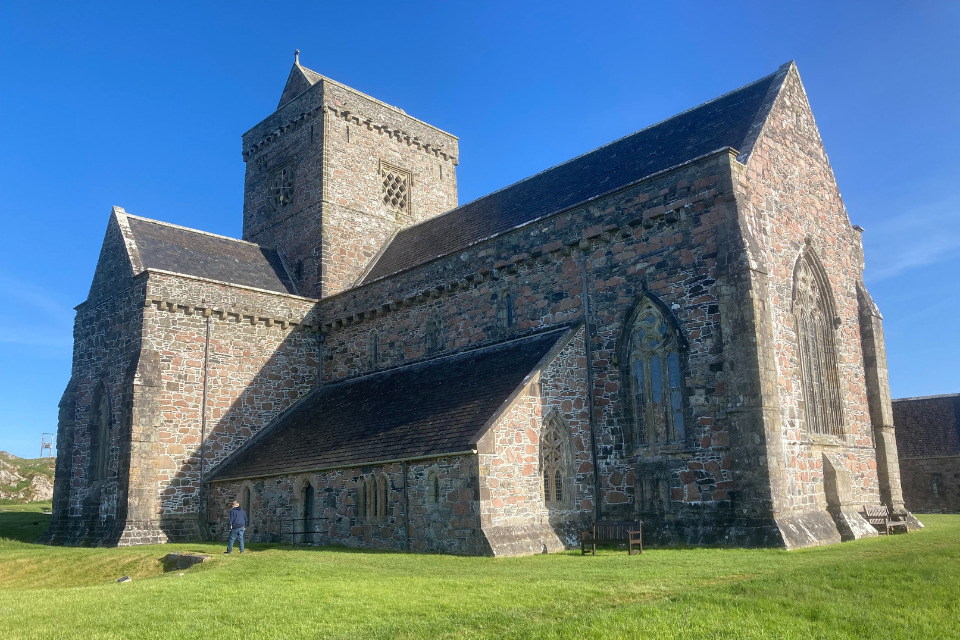
A social reformer at heart, MacLeod founded the Iona Community in 1938 as an antidote to the social fragmentation and hunger for relationships that he saw in industrialized Scotland. He had hoped for an inclusive place where people of all backgrounds could live and work and worship together, and then commit to doing acts of justice and peace in the spirit of Christ.
Today, the Iona Community holds true to MacLeod’s vision and St. Columba’s zeal by offering an ecumenical, intentional Christian community that welcomes people from all over the world. Members commit to upholding the community’s vision and values and following the rule that guides life together, and they welcome seekers to experience the community for themselves.
The thirteen pilgrims from Northern Michigan University visited the Iona Community as guests for a week of renewal. The idea for this trip, according to Rev. Erica Thomas, director of NMU Wesley, came out of the belief that international study and immersion in community are formative for young adults. Campus ministry certainly builds community, but there’s also growth found by going outside one’s comfort zone and engaging different cultures abroad.
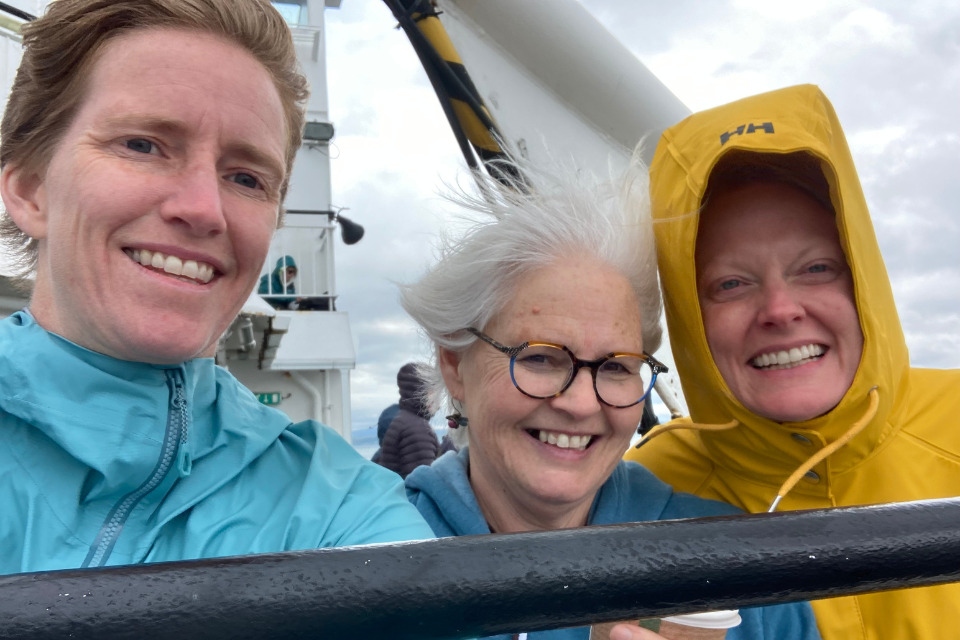
On the campus of Northern Michigan University, NMU Wesley works collaboratively with several other mainline Christian campus ministries, and this pilgrimage to Iona was an idea from the Lutheran campus pastor, Rev. Bre Kinnunen, that caught fire among students.
Once campus ministry leaders proposed an itinerary, students held fundraisers, leadership sought grants from the Michigan Conference, the Northern Waters District, and others supporters, passports were applied for, and everyone prepared for the pilgrimage to Scotland.
Even though Sylvia Dhaseleer had recently graduated and moved back to live with her family in Rhinelander, WI, she was invited to join her NMU Wesley friends to Iona. NMU Wesley supported her when she was a student. Sylvia said, “Campus ministry to me was invaluable, especially as a freshman. I didn’t know anyone. They became the community that made me feel welcome.”
Gracie Witt, another NMU student from Bruce Crossing, MI, was excited to go with friends she’d spent so much time getting to know at NMU Wesley’s CommonGrounds coffee shop. It’s a place on campus for students to hang out and have a free cup of coffee. But it’s also where campus ministries gather for devotions or share meals together. “It’s really cool having a space made up of different ministries,” she said, “and it’s a very open space where you can feel free to talk about ideas, whether or not they’re different or the same.”
The culture of these campus ministries at NMU has shaped the lives of these students, and this Christian community laid a solid foundation for their experiences on Iona.
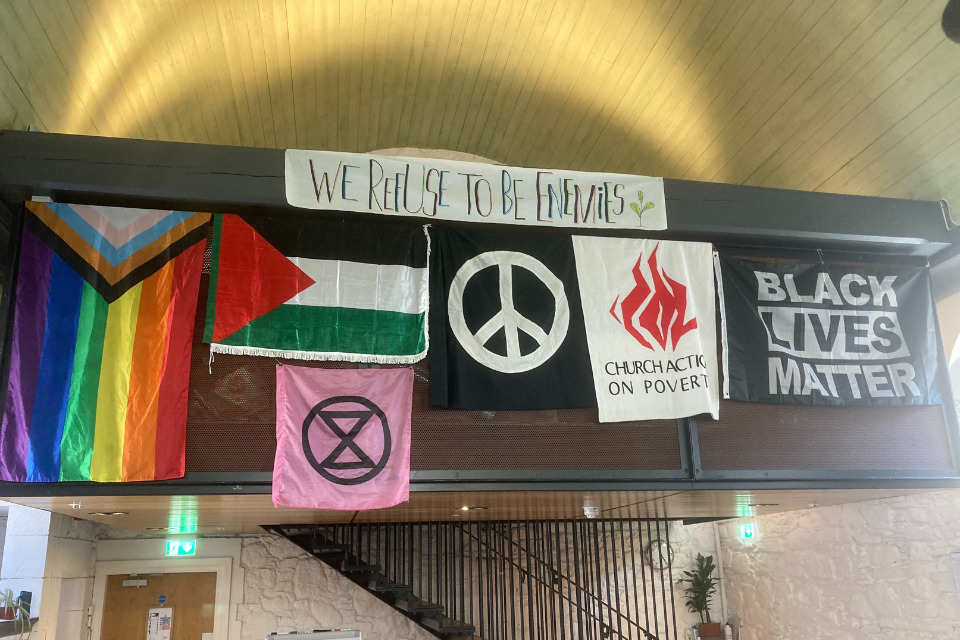
Some 120 permanent residents live on the island, with many working at craft farms. There were about 45 guests visiting the Iona Community the week the NMU pilgrims were there, so with year-round residents and staff, there were about 70 people that gathered daily for shared meals, worship, and community tasks.
The welcoming spirit of the Iona Community was evident as soon as they hopped off the jetty. It felt very Wesleyan but has roots in the Celtic Christian beliefs that infuse the community. It’s a theological perspective that starts from a place where God created us and said we are good. We might make mistakes or need to find our way back, through Christ, but we are beloved by God.
Sylvia noticed it immediately when they were led into the refectory where they ate their meals and noticed the variety of flags and banners representing marginalized communities on display. There was an LGBTQ+ Pride flag, a Black Lives Matters flag, and others. “I thought this was a really cool thing on their part, not only to do the research to find out what would make people feel welcome, but to go out of their way and find flags to hang up just for that entryway.”
Gracie felt that welcoming spirit as well during her time at Iona. “The feeling of community and acceptance that you got at the abbey was so refreshing and great. . . . I really got a strong sense of how we are all created in God’s image just as we are, because [the Iona Community] was very accepting and open and such a diverse group. But we all got along very well.”
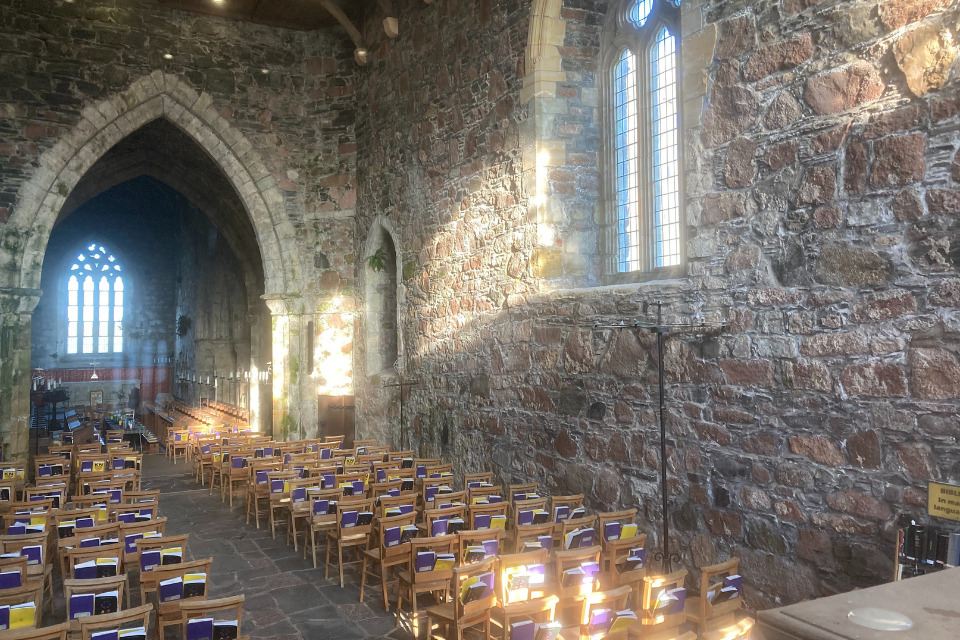
The Iona Community draws people from all over the world, and the NMU pilgrims got to eat meals and have great conversations with people from a variety of places, including Germany, Canada, and Ukraine. These guests were from different cultures and Christian traditions.
What sets each person apart was affirmed. And it seemed as if the personal connections were effortless, with conversations happening naturally. Finding common threads between strangers and making friends came more quickly.
In many ways, cultivating an openness to and expectation for relationship is a hallmark of the Iona Community. The NMU pilgrims experienced this. Sylvia explained, “We were already there to learn new things and meet new people. So, it was something that everybody dove into. It was a very forgiving community, as we tried to understand one another’s differences.”
Gracie had some eye-opening conversations with a refugee around her age from Ukraine. This in-the-flesh interaction with someone directly affected by war had a transformative impact on her. Gracie listened to how the woman and her family fled for refuge in Scotland and how she was now preparing to return to Ukraine to study at a university there.
Stopping our busyness to sit down for a meaningful conversation and really get to know another person is a takeaway that Gracie is hoping to make happen as she has returned home. “Being in Iona is something that inspired me to create a more intentional community wherever I go, which is so important in people my age seeking connection in a time of social media.”
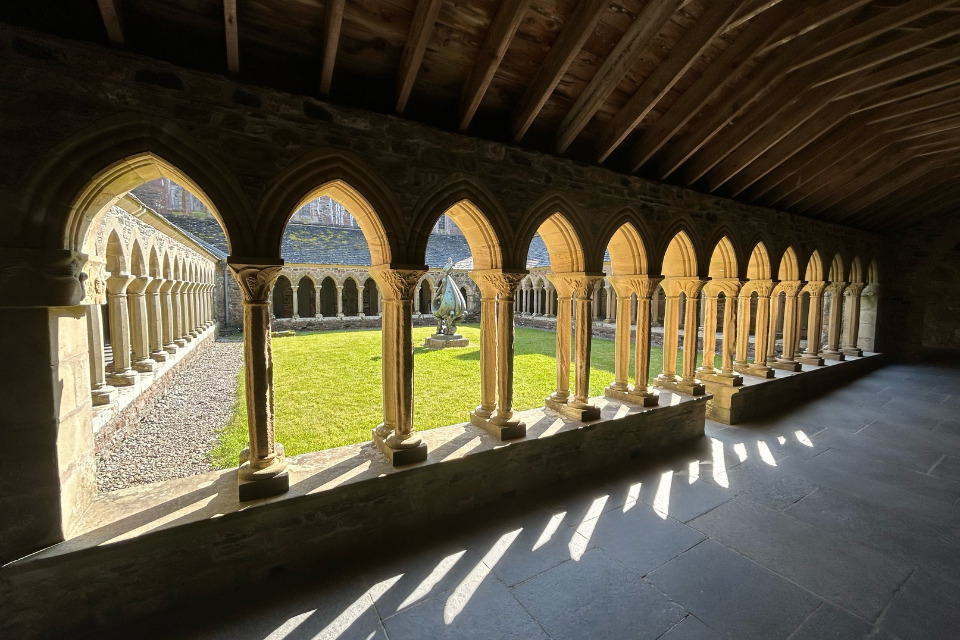
There was a rhythm to daily life in the Iona Community, one that gave simple structure through worship, prayer, meals, and work. And there was an intention to how it all fits together, a belief in the community’s health and well-being, and a respect for the God-given resources they have. And the year-round members of the community modeled it well.
Worship times were held in the abbey church with simple instruments and hymn books. Teachable choruses punctuated guided hikes around the island. Meals were cooked sustainably and mostly vegetarian, and the community sourced as many local ingredients as possible. As far as work, each guest was assigned daily chores to maintain the community’s life and efficiency. Gracie worked each day with a couple of others cleaning a gift shop that was part of the community. Sylvia mopped floors.
But the schedule was not so prescriptive. In fact, there was quite a bit of freedom to explore on your own. Erica noted, “There was beauty in the flexibility of the schedule. There were key things they’d encourage you to attend, but then for other things, it was a matter of choice.”
Sylvia enjoyed the daily tasks and worship times together, but she especially appreciated the time for self-reflection. “On several days, I’d spend the morning after our chores or the afternoon after lunch on my own wandering journey about the island. My favorite part of the spiritual journey to Iona was the self-reflections after services or group gatherings.”
She has continued this practice upon returning home to Wisconsin. “One of the first things I did when I got back home was going out into my yard. Then I picked a direction in the woods and started walking. And I’ve kept that up a lot more, going out to explore the world around me. Iona taught me better habits for self-reflection, which was really hard for me to do before.”
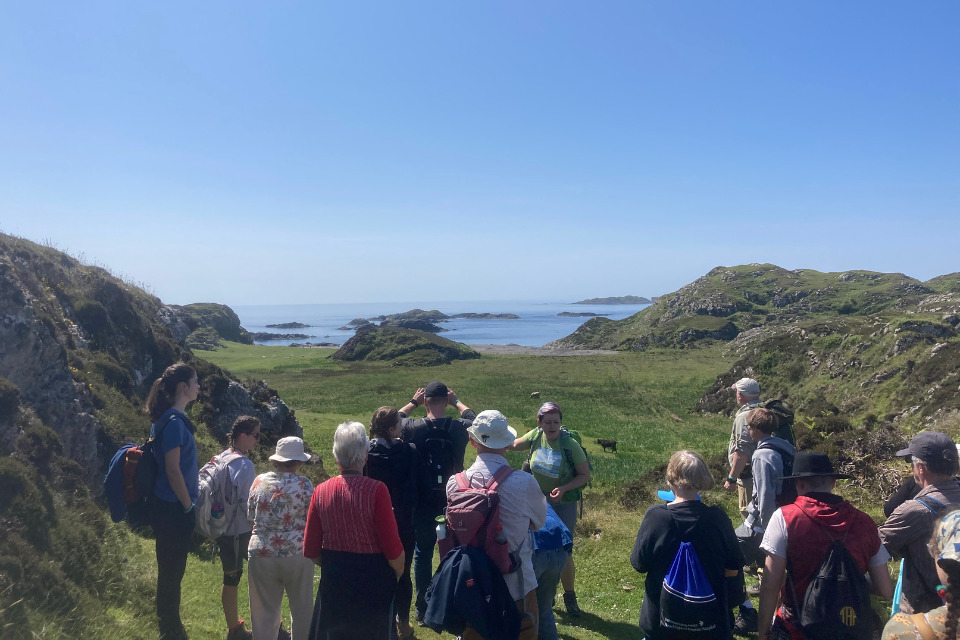
Exploring God’s creation wasn’t hard for the NMU pilgrims. They just had to step outside to see the turquoise-colored ocean, the green, craggy hills, the sheep grazing in fields along the road, the cartoon-like puffins squawking and jumping, and the stunning sunsets on the beach.
Reconnecting with the natural world—God’s creation—away from many technological distractions was something Gracie appreciated about her time on Iona. She felt safe walking around the island and explored a lot on her own. “Just being on the island,” Gracie said, “surrounded by this wonderful community in this beautiful place was just something that I felt so strongly. . . . I had not felt the presence of God that strongly in a while.”
The Iona Community is committed to caring for God’s creation, made with divine intent, and ensuring it is championed for and not ignored.
Sylvia understood that clearly. “That’s something that I thought about a lot on the island,” she said, “about the earth around us being something divine and something not only to be thankful for but something to be cared for. It’s not to be left alone or untouched. There’s divine interaction there.”
This respect for God’s creation moves the Iona Community to be justice-minded, and they hope that Christians in their community will address climate change, industrial issues, and fight for matters of equality for those most vulnerable, including women and children.
Many of these beliefs echoed with Sylvia, and she is now better able to explain why she believes what she does. She explained, “I always had the idea of things being holy to me, like my family or the place I grew up, those things were always precious to me. But I didn’t understand how they could fit into my faith life and truly be considered holy or divine until reading about Celtic Christianity and taking this trip and discussing it all with people.”
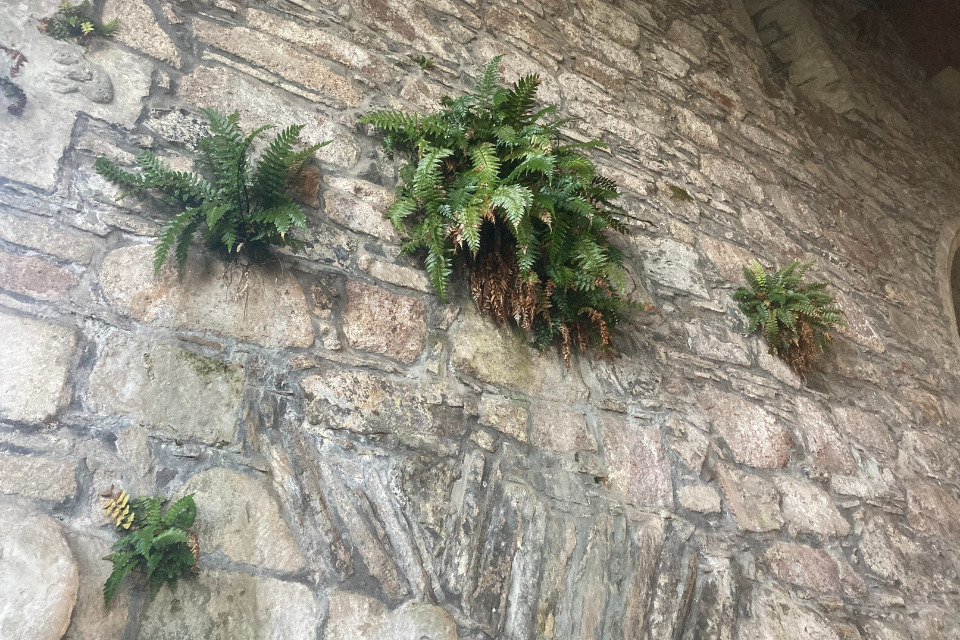
The experiences the NMU pilgrims had at the Iona Community in Scotland were unforgettable, and the young adults will be thinking about the things they saw and learned for a long time.
As a campus minister, Erica is grateful for the NMU campus ministry community that helped to shape these young adults and continues to do so with endearing friendships and experiences.
“I think the hope for me,” she said, “is that this trip really opened their eyes to the fact that there is a whole world out there, and going out and exploring it is really exciting and life-changing and transforming. And so, it’s a gift that we had so many people support us to give these students a chance to experience that and feel it in their faith journey.”
Sylvia hopes to go back to Iona someday and take her mother along with her. Gracie would love to as well.
Looking back over her Iona experience, Sylvia reflected, “I’ve always been an avid believer in the idea that journeys don’t have an end, whether it’s a spiritual or faith journey. You’re never going to find an end because you’re always going to be a changing person.”
Rev. Erica Thomas and NMU Wesley would like to thank the Michigan Conference Board of Young People’s Ministries, the Northern Skies District, Marquette: Hope UMC, and many individual sponsors for their prayers, encouragement, and financial support that made it possible for seven students to participate in this life-changing pilgrimage to Iona.
Last Updated on September 6, 2023

